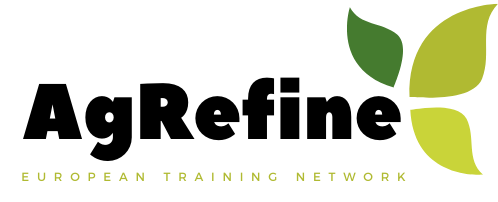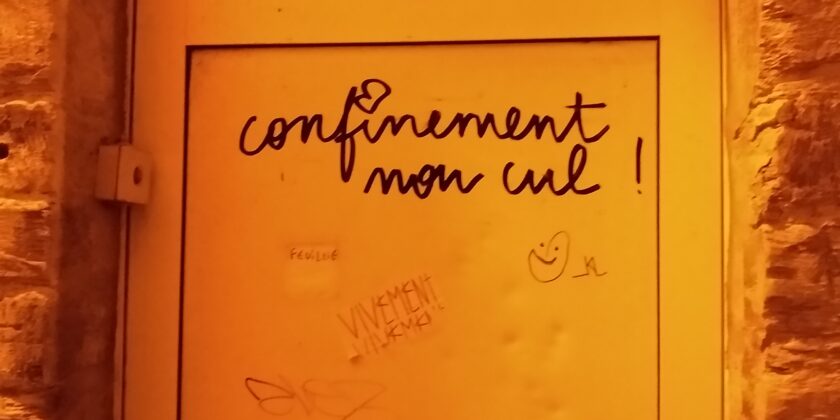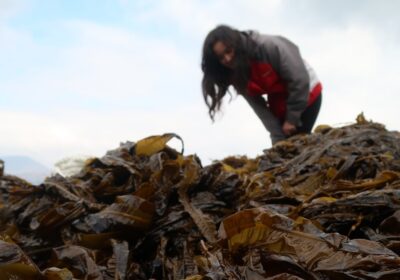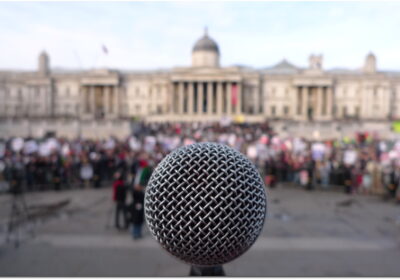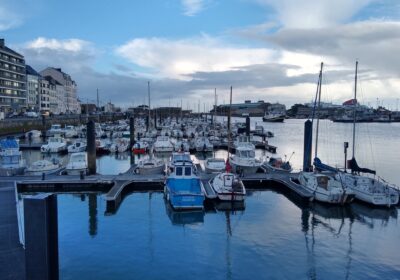This is the third part of my blog series on our AgRefine Ireland trip. In the first part, I explained how travelling is a political statement and how this trip was a very poor one. In the second, I tried to tell the tale of my journey, but instead elaborated on the many intricated challenges of travelling sustainably in Europe. In the process, I unveiled a terrible conspiracy and I concluded on calling our international transport system a massive failure that results from decades of garbage policies.
In this blog, I will finally tell the story of my journey and for once, I will leave any political implications out of it. You may sit back and relax, it’s story time! Instead of going along the different steps of my journey, I will tell you of the people and the stories I met along the way.
A plan on tracks
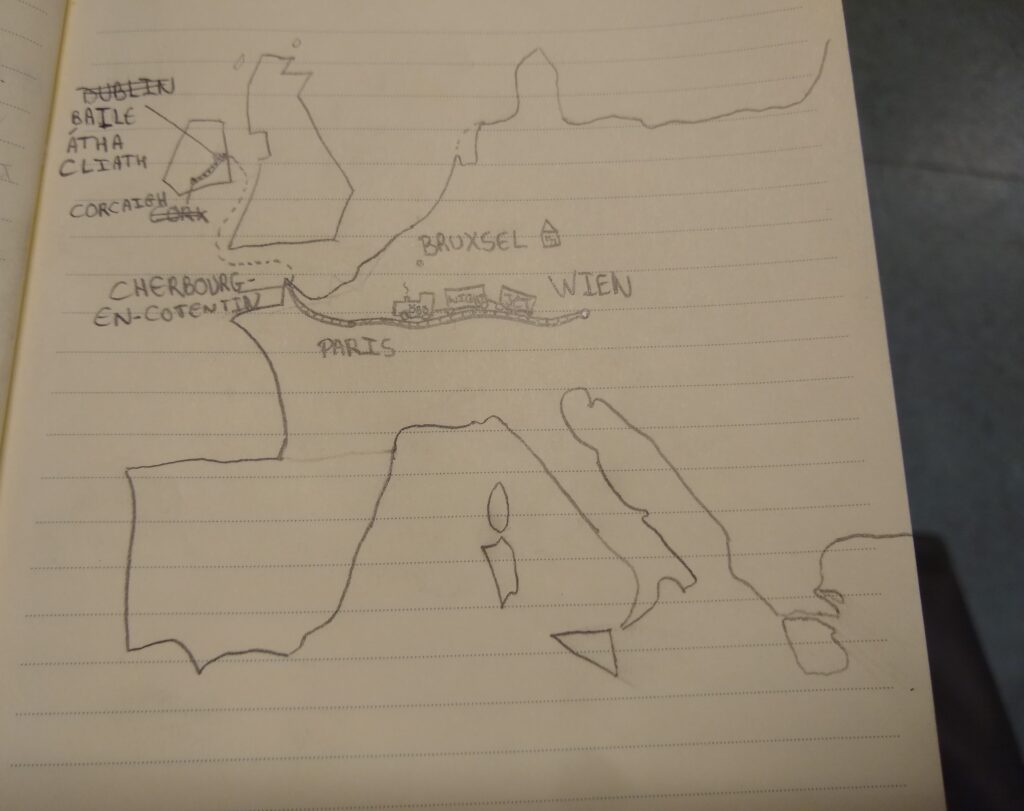
1. Gideon
I met Gideon during the first leg of my journey, in the night train that took me from Vienna to Paris. I booked a bed in a 4 people cabin, that I would describe as cosy and reassuring but that taller or fancier people could find somewhat cramped. What I like about these compartments is that they are places where regular life and interactions casually happen. They might not constantly deliver the most enticing stories, but they always give something. Here, they gave me the life story of someone my age, from a different continent and a much different reality.
Gideon is twenty something and he is from Ghana. He’s the eldest of his siblings, and he comes from a rural village of farmers. His parents are no exception: they are also farmers. They managed to send him to Ukraine to study medicine, for they have but one wish for their children: to have a better life. Gideon wanted to be a pilot, but his father told him: “You will study medicine.” Therefore, he is now set to become a cardiothoracic surgeon. Unfortunately, he doesn’t like hospitals because people there are in suffering. But you know, you get to be a doctor.
Gideon carries a lot of hopes, and he knows it. A bit later in the conversation, he half confessed that he was producing music in his free time, gospel. He half confessed because he’s keeping it a secret from his family, because his father would not accept. It’s not that religious music would play bad over dinner. But if he’s not devoting a hundred percent of his time and energy to his studies, then he is not keeping up with the expectations on his shoulders. He was really excited to show me several tunes he made, which were beautiful. He was playing the keyboard. I asked him whether he took his keyboard with him, but sadly, he didn’t. Rather, he couldn’t.
See, Gideon was a war refugee. He had to flee Ukraine as the war spread, and he headed for Poland. Like many others, he was denied safety and help upon arriving at the border, so he had to go back and plan another crossing, this time through Czechia. Which lead him to Vienna, and then to a curious passenger on a train from another epoch.
He loves Ghana, it is his home. He misses its culture, its food, its nature. In spite of this, he still plans to finish his studies in Europe, then to practice a few years in the UK, before settling in Australia. Maybe all this moving around is motivated by his dream of being a pilot? When asked why he doesn’t plan to live in Ghana, he told me how doctors that he met there told him that if they could have another shot at life, they would probably not be doctors again. Because of the pay, and the bad working conditions. He felt also that the government there was too corrupt.
One could discuss extensively Gideon’s story under the light of colonialism and structural racism, and even make some witty anticapitalistic comments here and there. But this is not a political blog so I will end on this: in Ghana, there is a national park where you can walk in the canopy, where towering trees come to kiss the skies. How great is this.
2. Christopher
Paris, Gare de l’Est. I’m nervously walking out of the station and heading towards Paris Saint-Lazare to catch my connexion to Normandy. I have plenty of time, mind you, I will catch my train. But my guts are still recovering from the panic I felt just before. Let’s rewind the clock just ten minutes.
I just left my train and I’m happily walking in the station, looking forward to the rest of my trip. I check for the usual shape of my wallet in my pocket but then disaster strikes: the shape is gone. I check all my pockets, sense nothing, and in these excruciatingly slow seconds of realization it dawns on me that I lost my wallet on the train. Or maybe was it stolen? My heart skips a beat and I start running, faster and faster back to my train. In my head, the thought materializes that without my wallet, I have no money and no identity. I cannot possibly embark on my ferry, nor get to Ireland. I cannot buy food or find accommodation. Without these little bits of paper and plastic, am I still somebody in this vast city that is no home to me?
I reach the platform. My train is still there. I jump in, mumble some nonsense in a mix of German, French and English to the controller, find my compartment and start searching. I find nothing. I mumble some swearing in a mix of German, French and English to myself and I leave the train. Let’s be rational – what could have happened? I sincerely trusted my former travel companions, they wouldn’t have stolen from me. But then where is my wallet? I ask the train staff whether a wallet reached them, unfortunately none did. They suggest that it was stolen, I answer that no one would have stolen. They say I’d be surprised. Who could it be? The middle-aged guy who slept all the way? The woman who offered food to everyone and expressed sincere compassion for Gideon and offered to help him? Both seem unlikely… Gideon then? Wait, am I racist and xenophobic for doubting him? That’d be a bummer.
Let’s put the clock back where it was. Paris, Gare de l’Est. I’m nervously walking out of the station and heading towards Paris Saint-Lazar. I’m nervous, but I feel again the familiar shape of my wallet in my pocket. As it turns out, it had fallen under the bed and it didn’t occur to me to search there the first times. Upon recommendation from a helpful soul, I searched the cabin one last time and found it lying there, on the floor. As it turns out, I can trust people not to be thieves and I can trust myself to be consistently idiotic. Maybe I could blame the German police for their border controls in the middle of the night that prompted me to reach for my wallet half asleep, but I’m not that delusional: this one is on me. As I walk, I’m hailed by someone in front of a bakery. Meet Christopher. He’s asking me for a few coins and well, has there ever been a better time to show some gratitude and help someone in need? I asked him if he’d rather have something from the bakery, and he happily answers that a coffee would be great. “Tu voudrais quelque chose en plus de ça ?” I ask. He says that he’d love to have a crêpe, or wait maybe two! Just with sugar. I went in and got him just that, plus some for myself too. They were delicious.
Eating delicious crêpes in the morning is bound to make anyone happy, and I think it really did the trick for him. We chatted for a little while, and when I left, he blessed me. Not casually, really with sincerity. As someone who never believed in God, I have no clue what to do with this. It made me feel odd because I had to be touched by his sincerity.
3. The woman who protects a nuclear submarine
Cherbourg-en-Cotentin is a charming town in Normandy, where small artisanal shops are still alive in quite the number. In its centre, the little houses that line its narrow streets and secret-looking passageways are abundantly cute. All around that are massive industrial complexes that, for decades, have rhythmed the lives of the Cherbourgeois·e·s. The region counts several big nuclear complexes that produce energy and treat nuclear waste. The town itself counts four harbours and saw the Titanic make its last stop in continental Europe before the unsinkable met his very much sunken destiny.
Not far from the military harbour, in La Cité de la Mer (The City of the Sea), the woman who protects a nuclear submarine stands guard over Le Redoutable (~the formidable, the fearsome, the awe-inspring, the one you should strongly dread). One certainly has to be quite formidable themselves to be in charge of such force. Keeping her good spirits, she’s watching over the old cold war giant who never fired a single shot but could have wiped out all life on Earth.
When I visited, it was a sunny day and she was standing next to the entrance to the submarine. Just before me, a large family that managed to be even louder than they were numerous had started their tour. It is by my (understandable) avoidance of the group that we started talking and that I shared the story of that redoutable woman, the smiling keeper of history and monsters.
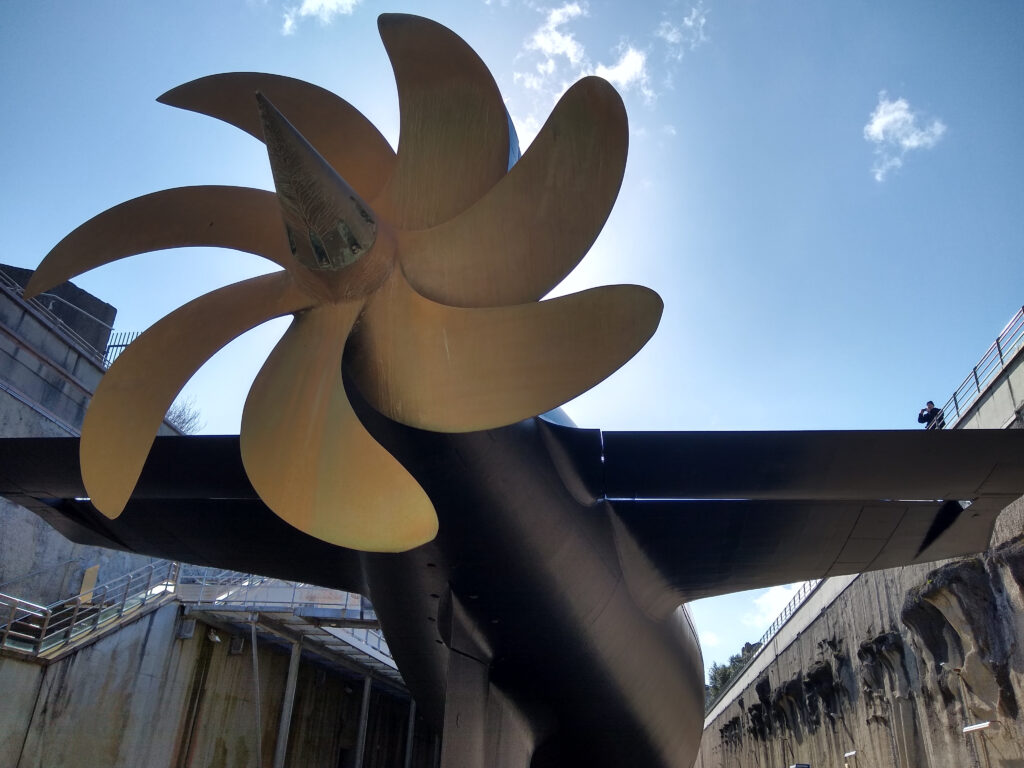
4. The ocean
When planning this journey, I did not know who I was going to meet. I only knew for certain that I would meet this ocean between France and Ireland, and I was excited about it. I was excited to spend two and a half days in Cherbourg, a town right on the coast! I was thrilled to spend an afternoon, a night, and a morning among the seas on the boat. I wanted to watch waves crash onto rocks and the wind setting the waters free into the air. Above all, I wanted my senses to feel that loaded air and the flow of time, to hear and smell that wild landscape, and I wanted my bones to feel the ineluctability of the ocean’s will.
I only knew for certain that I would meet this ocean, but I didn’t.
Cherbourg-en-Cotentin is a charming town in Normandy, where small artisanal shops are still alive in quite the number. All around that are massive industrial complexes, among which large harbours. They rhythm the lives of the Cherbourgeois·e·s, but they also condition these lives. In Cherbourg, the ocean is cut off from itself and tamed to make way for industry. Similarly, people are also cut off from the ocean, to make way for industry. Are they also tamed? The entire town’s coastline is used up exclusively for industry, fishing or boating. There is no meeting the ocean here, Cherbourgeois·e·s say so themselves. You need to go out of town, but sadly there is no public transport or no way to get a bike. In Rome, do as the Romans do. In Cherbourg, I too will remain cut off from the ocean. At least until my ferry comes, Sunday afternoon.
I arrived in Cherbourg Friday afternoon. On Sunday morning, I got an SMS message. I thought it was 2012 again but no. It was the ferry company telling me that the ferry was delayed for “at least 24h”. Right on, what do I do with this? Apparently, it is due to weather events when they attempted to cross. The weather had been lovely for days in Normandy and Ireland, I was aghast. I could not afford one day of delay: I would miss one of the two days of training for which I was doing 4 days of travelling already. Also, a delay of at least 24 hours might just as well be 48, 72, or always.
I understood that I would never get on that ferry. Defeated, I packed my bags and I walked to the train station: I had no choice but to head back. I had only known that I would meet this ocean. I would not.
5. Inès
Inès is one of the most amazing people that I know, and she has been my friend for years. She is a lot of things that I am not, and I that she isn’t. But a curiosity and an appreciation for diversity and differences are among the many more things that we share. She is Tunisian-French. She grew up South of the Mediterranean and she went to study further in France after high school. Eventually she landed with us in Belgium, and we got her to stay four years under our national rain, which is saying a lot: she found another home. However, a home isn’t everything that Inès is pursuing. She went back to France where she completed two prestigious masters, following her ambition and rightfully trusting her talents. She lived in Paris, and then in Nice. There, she vowed never to forego a life by the sea. Yet here she is again in Paris. The sea, just like a home, isn’t everything that Inès is pursing.
When I understood that the ferry would never come, I had to leave Normandy. I had to make a choice: do I still try to make it to Ireland, or do I go back to Vienna? It is a value conflict. To go to Ireland means flying. To go back to Vienna means that I’m not going to Ireland after all the efforts I put in it and after having looked forward to seeing there all my AgRefine colleagues. It also means that I am missing a mandatory training. Whatever I choose, I transgress values that I hold dear.
From Normandy, I took a train to Paris and Inès and I met at a café. There was no more travelling that day anyway and she offered me to sleep at her place. Her cat, Hermès, was kind enough to give me allergies.
The next morning, I picked up my bags and I left happy to have seen my friend. I went to the airport and I flew to Cork, Ireland.
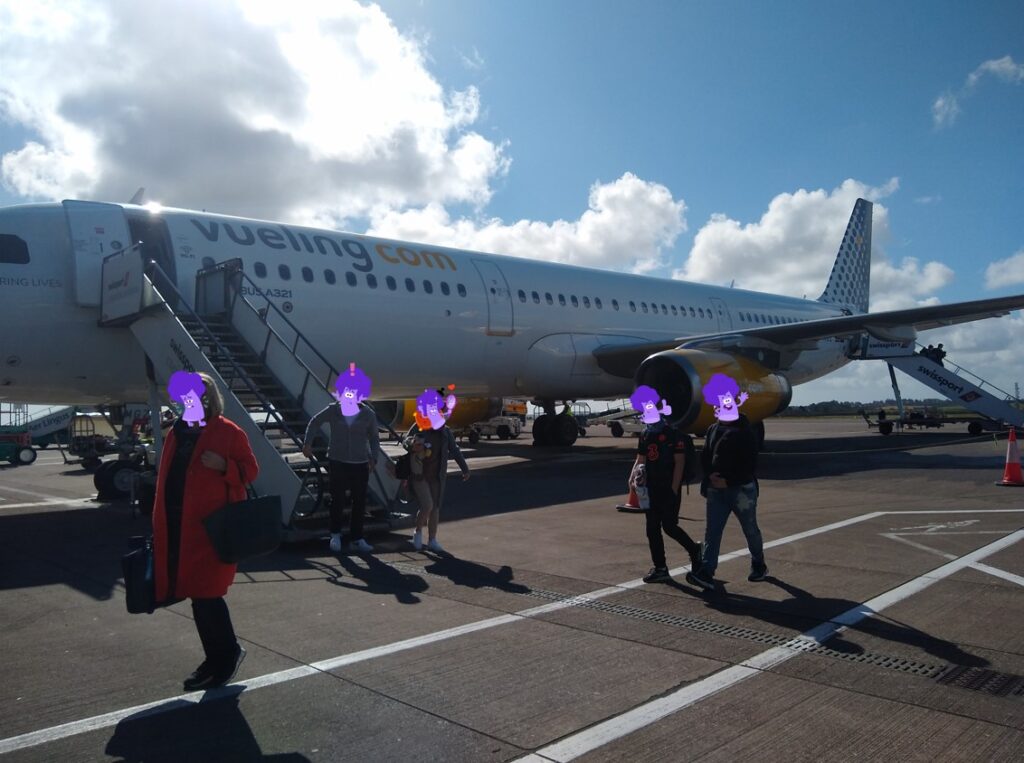
6. Ireland and Vienna
I said earlier that I would tell you of the people and the stories I met along the way. We have come to the end of the way. Of course, a lot happened in Ireland, but this is not the subject of this blog. Shrewd readers will notice that I still have to talk about the way back, but there were no people and no stories there. Indeed, I flew back from Ireland to Vienna. I cancelled the ferry and train bookings. I really lacked trust for the ferry company, and I also noticed that I made a mistake in my booking. In the second part of the blog, I explained how challenging it was to manage all the different options, reservations, websites and so on. Well, I managed to book an impossible connexion, that I was missing by fifteen minutes. There was no alternative that did not imply spending another full day of travelling, by day and not by night, and I simply did not have the will or the energy for this.
In the next and final blog, I will conclude this series on Ireland. I will sketch a clear and concise summary and discuss some key points. I will try to communicate my perspective on living and travelling sustainably and happily, such that our lives exhale a creative energy rather than the current destructive one.
Bisous
PS: I lost trust for this ferry company at this time, but I’ll be trying my luck again in June with a ferry to Norway for a course. Is it faith or stupidity? Time will tell!
